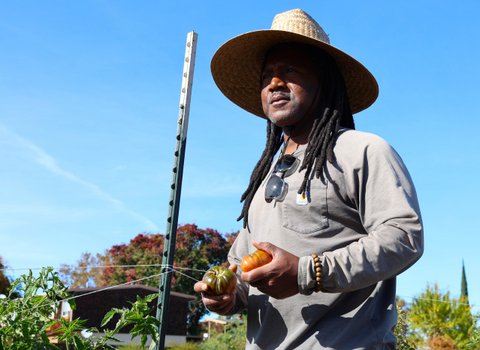
28 Nov ‘If You Can’t Grow Your Own Food, You’ll Never Be Free’: Urban Farmer Plants Seeds for Change in Pittsburg

“It’s not about providing a farm for them — it’s giving them something to be proud of,” says Ray Harts, owner of Healthy Hearts urban farm in Pittsburg.
Story and photos by Joe Porrello
A passion for health and the betterment of his community led Ray Harts to start Healthy Hearts Institute in the El Pueblo Housing Development of Pittsburg in 2017. The urban farm has since grown over 70,000 pounds of produce for local residents and provided them with various wellness classes.
But, for Harts, it’s about more than produce.
“It’s not about providing a farm for them — it’s giving them something to be proud of, and I think that’s what will make a change in people’s lives,” he said. “Maybe they never get rich, but they’re living happier, healthier, longer lives and more socially connected.”
- Healthy Hearts urban farm in Pittsburg, next to the El Pueblo Housing Development, aims to grow self-sufficiency in the community along with produce.
As a nonprofit organization without financial stability, Healthy Hearts Institute often lacks the capacity to deliver its produce.
“People have an open invitation to come to the farm whenever we’re here and grab food for free whenever they want,” said Harts.
Now 50 years old and married with three children, Harts’ inspiration for the project partly stems from growing up near the El Pueblo Housing Development.
“When I was a kid, everyone had gardens and fruit trees in their yards. I remember every weekend seeing somebody’s mother or grandmother shelling peas or cleaning greens — it was always harvested food, never from the grocery store.” said Harts. “My great-great-grandmother used to take us to Brentwood and Oakley, and we’d pick peaches, peas or collard greens.”
- Ray Harts, owner of Healthy Hearts urban farm in Pittsburg, picks a rare fresh eggplant during the offseason for growing.
Harts also attributes his devotion to health to his father, who was in and out of prison.
“Everytime he came home, he’d be ripped — he looked like a superhero,” he said. “I wanted to be like my dad; I started exercising at around 6 years old just so I could make my chest jump like he did.”
His own incarceration about 25 years later would end up sparking Harts’ mission, as he thought up the idea of Healthy Hearts Institute from a bunk bed in California State Prison, Corcoran.
“No one was going to hire me; I was going to have to work for myself, so I started educating and preparing myself to reenter society with some tools,” he said.
- Ray Harts had to do lots of research before starting Healthy Hearts urban farm in Pittsburg — like how to create the right soil recipe for certain crops.
Harts wrote his business plan in 2012 and was released in 2013 after serving eight-and-a-half years of a decade-long sentence. While still in prison, he met the founders of Planting Justice in Oakland — an urban farm and organic nursery — who advised Harts on how to proceed.
After connecting with master gardeners, the Resource Conservation District, and the UC Davis Cooperative Extension, Harts purchased about two acres of land in 2016. The field where the farm is, according to Harts, had been lying fallow for over 20 years with weeds that were four or five feet tall.
- Ray Harts prepared his community farm before Los Medanos College students were set to tour it on Nov. 15.
“I reached out to the housing authority and asked if I could start a community garden, and they accepted,” he said. “For them, it was a win because they didn’t have to cut this grass a bunch of times every year.”
Still without funding, it would be another year before ground was broken.
Starting with 10 raised beds in 2017, Harts initially watered his crops by hooking up 200 feet of hose over the fence to an accommodating neighbor’s water supply.
- Some of the original raised garden beds at Healthy Hearts in Pittsburg still stand about seven years after they were built.
A 40-by-50-foot in-ground plot along with an irrigation system in 2018 followed.
Next for Healthy Hearts Institute came classes taught to local residents on meditation, mindfulness, nutrition, cooking, ecotherapy, gardening and environmental sustainability.
When the COVID-19 pandemic began in 2020, Harts was forced to shut down his classes. Instead, he expanded the farm, breaking ground on another acre of land that’s been producing crops since 2021.
- Just a fraction of the space used for gardening crops at Healthy Hearts urban farm in Pittsburg, which currently awaits the planting of a new harvest when weather permits.
Now, Harts is trying to get the local residents more involved again and continue changing the narrative around the El Pueblo Housing Developments.
“This is just the tip of the iceberg. There’s so many other things that I want to do,” he said. “I don’t want people to look at (El Pueblo Housing Developments) as a low-income community; I want them to look at it as a healthy living community.”
>>From Our Archives:
Thriving Garden in Bay Point Serves Community<<<
Harts believes the farm offering new gardening classes, which would last from eight to 20 weeks and include stipends for participation, can bring positive change to the community.
“You’d be getting money for your bills, learning a lifelong skill, and more importantly, you’d be building relationships with other people in the class,” he said.
- Two Contra Costa County urban farm owners, Ray Harts, left, and John Matthesen, help each other out when they can. Matthesen is the CEO and head farmer at Rodgers Ranch in Pleasant Hill.
The value of people being able to produce their own organic crops is immeasurable, Harts says.
“My hope has always been for the community to come out and grow their own food,” he said. “If you can’t grow your own food, you’ll never be free. If you need to go to a restaurant or a grocery store to eat, you’re tied into a system.”
>>>From Our Archives:
Activists Try to Renew Black People’s Connection to Land and Healthy Food<<<
Whether or not the classes featuring stipends come to fruition, Harts says he wants to educate people on the value of consuming produce without genetically modified organisms, pesticides, herbicides or fungicide — like that he grows.
Such chemicals can make the fruits and vegetables grown look nearly flawless, but Harts noted many are not aware of the health risks involved with consuming said products. He says food bank attendees in the past chose “grocery store tomatoes” over the heirloom tomatoes he had but fruits and vegetables grown organically taste better and feel better in the body.
- Even when out-of-season, heirloom tomatoes at Healthy Hearts urban farm in Pittsburg look ripe for the picking — and one of the garden helpers did just that, taking a big bite out of the raw delight and finishing it expeditiously.
But without funding, barriers grow larger for Healthy Hearts Institute to plant more crops and get its produce to community members. Their harvested fruits and vegetables used to be distributed at food banks, though a lack of resources has stalled such collaboration.
While volunteers at the initiative are currently needed and appreciated, Harts says finances to hire full-time help will be crucial in reaching his goals.
“The bottom line as a nonprofit is to raise money; you have to be able to pay people,” he said. “We can’t just run on volunteers because that doesn’t last long.”
- Ray Hearts, owner of Healthy Hearts urban farm in Pittsburg, plants, harvests, washes and rinses the majority of his crops with little assistance.
Similar initiatives to Healthy Hearts in areas like the El Pueblo Housing Developments, Harts says, are critical — but come at a cost to be effective.
“You need to pump a lot of money into it to get the community excited,” he said. “When you deal with a low-income neighborhood, people tend to give them the bare minimum, just enough to get by — and that’s what they’ve received their entire lives. It’s hard for them to see themselves in a different light when all they have is leftovers.”
Planting and harvesting food yourself, according to Harts, enables part of that positive self modification.
Growing your own food is a form of liberation — it’s resistance if you don’t like the way our food system is run and you don’t like the prices,” he said. “Harvesting food is ancestral and still in our DNA — it’s ecotherapy, it’s healing.”
Healthy Hearts Institute will host its annual holiday event during mid-December, the exact date yet to be chosen. Included in the festivities are s’mores and popcorn, inflatable slides, jumpy houses, music, three food trucks with no charge, around 600 toys given to kids, and, of course, pictures with Santa Claus.
Those looking to volunteer or donate can visit healthyhearts.co for more information.



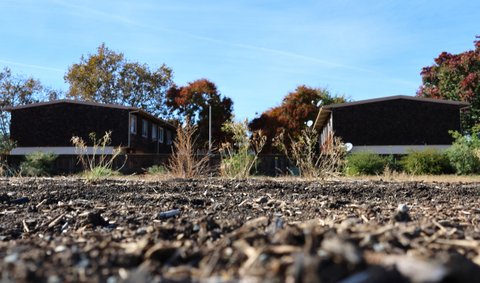
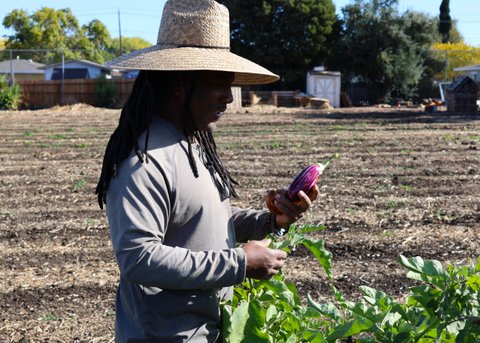
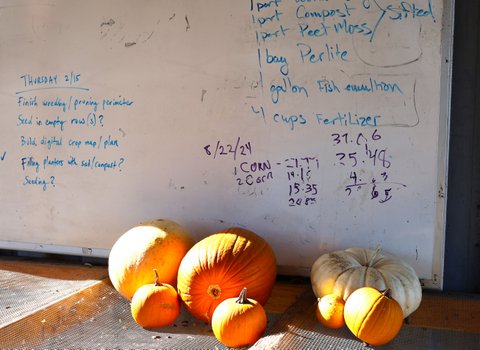
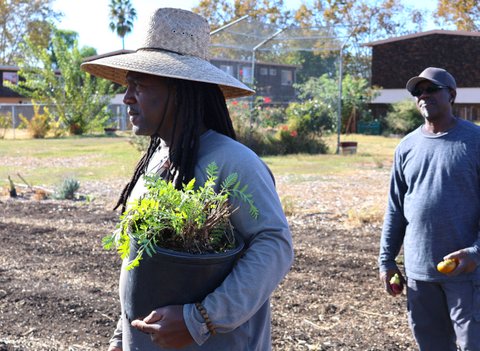
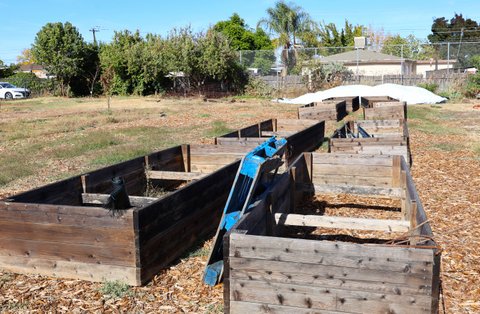
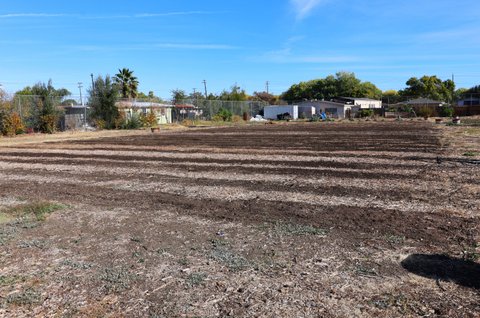
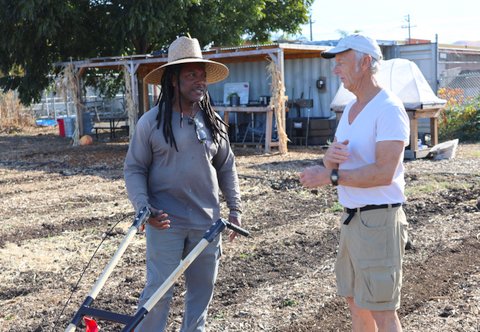
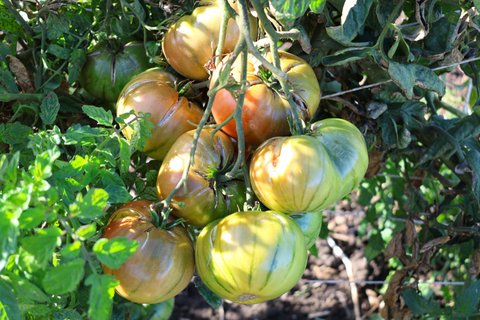
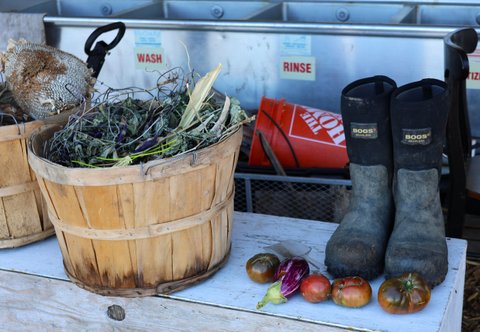
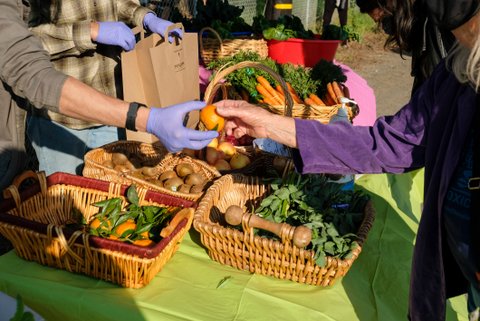
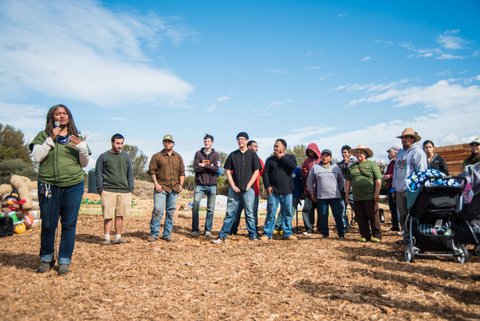
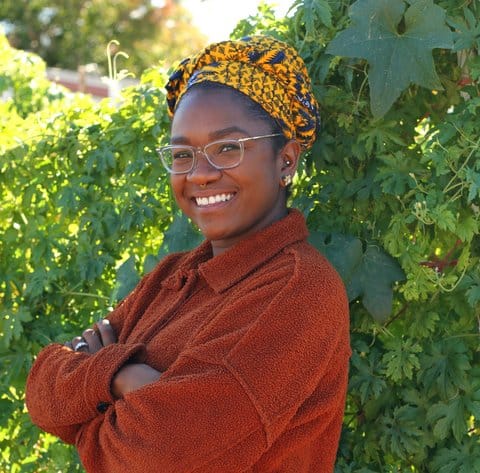
No Comments